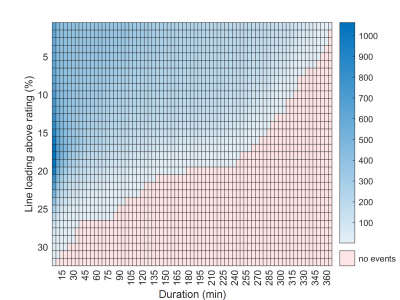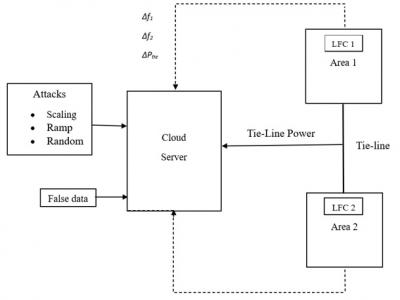Power and Energy
This research presents a multi-channel phase shift inductor-inductor-capacitor (LLC) resonant converter with a wide input and output voltage range that has been specially optimized for fuel cell applications. The worst-case minimum stack voltage and the battery voltage range were used to determine the optimal parameters of the LLC converter. The voltage gain of the converter operating at a constant power was considered, and an algorithm for such a calculation is proposed.
- Categories:
 222 Views
222 ViewsArc faults are a significant cause of failure in photovoltaic (PV) system and can arise due to component deterioration, installation problems, rodents chewing on wires, abrasion of insulation, or other root causes. Undetected, incipient arc faults can propagate into electrical fires. Consequently, arc-fault detectors, now mandated in many jurisdictions, are essential for safe operation of PV systems.
- Categories:
 672 Views
672 Views
This letter proposes a virtual slack bus Newton-Raphson power flow (VSB-NRPF) algorithm serving for the PF analysis of droop-controlled medium-voltage direct current (MVDC) systems operating in islanded mode without a slack bus. In the proposed algorithm, one of the original power, current, power/voltage and current/voltage buses is assumed to be a virtual slack bus with an initial rated dc voltage, the value of which is corrected based on the actual PF balance equation at the original bus.
- Categories:
 19 Views
19 ViewsThis repository contains datasets and code with a novel numerical approach aimed at finding a distribution network expansion plan (DNEP) that prevents future congestion and voltage issues. This approach is tested using the modified IEEE 33-bus network. Electricity demand and PV production data for a leap year with a 1-minute resolution was generated using the CREST model from the Loughborough University and is provided as a dataset of future high-load and high-production scenario.
- Categories:
 287 Views
287 ViewsNowadays, decentralized organization has become the emerging characteristic for AC-DC hybrid distribution systems (DS) facilitated by modern power electronic and information & communication techniques. This urges the DS to drop the centralized power supplying mode. In substitution, the DS is divided and operated as several self-adequacy subnetworks. In this paper, a two-stage Wasserstein distributionally robust optimization (WDRO) framework is proposed to provide a dynamic regionalization strategy for unbalanced AC-DC hybrid DSs.
- Categories:
 301 Views
301 Views
High-capacity and large-sized batteries are widely employed in electric vehicles and energy storage systems. The surface temperature (ST) field of these batteries is usually maldistributed and unmeasurable in practice, which brings great challenges to temperature safety monitoring. Thus, this paper rebuilds the lumped thermal model and proposes a KF (Kalman filter)-MLP (multi-layer perception) joint estimation algorithm to reconstruct the two-dimensional (2D) ST field of lithium-ion batteries (LIBs).
- Categories:
 77 Views
77 Views
The Illinois 200-Bus Cyber-Physical System (CPS) serves as an important case for studying risk analysis through the integration of physical and cyber components. This system designed to reflect real-world architectures. Access Complexity scores are assigned to its network edges based on the Common Vulnerability Scoring System (CVSS) Access Complexity (AC), allowing for the simulation of adversarial pathways within the system.
- Categories:
 131 Views
131 Views
<p><strong><span style="font-size: 9.0pt; font-family: 'Times New Roman',serif; mso-fareast-font-family: 等线; mso-fareast-theme-font: minor-fareast; mso-ansi-language: EN-US; mso-fareast-language: EN-US; mso-bidi-language: AR-SA;" lang="EN-US">When the random pulse width modulation (RPWM) technique is applied to insulated gate bipolar transistor (IGBT) modules, the switching losses are decreased to different degrees. In order to study the principle of this control method, this paper starts from the perspective of Joule heating principle.
- Categories:
 102 Views
102 ViewsThe efficient operation of interconnected power systems relies on Load Frequency Control (LFC) to maintain stable frequency and regulate tie-line power flow between distinct areas. In modern setups, LFC parameters are monitored and processed in real-time through cloud-based platforms, enabling centralized control and optimization. However, this introduces vulnerabilities, as demonstrated by the susceptibility to attacks such as scaling, ramp, and random manipulations of data transmitted between areas and the cloud server.
- Categories:
 505 Views
505 Views
The traditional wired charging mode requiresautonomous underwater vehicles (AUVs) to be salvaged to the ship for energy replenishment, which cannot work continuously and is complicated to operate. To address this issue, since the battery voltages of AUVs are low, a convenient high-current wireless power transfer (WPT) system is introduced for the AUV batteries with low-voltage, it may cause large losses in the receiving coil and an unbalanced current-sharing issue among the rectifier diodes.
- Categories:
 186 Views
186 Views



